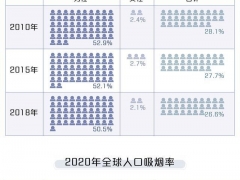
帕特里克·巴沙姆(Patrick Basham)是卡托研究所(Cato Institute)的兼职学者,也是民主研究所(Democracy Institute)的创始主任。
在新冠病毒大流行中,想象一下全球最高卫生机构指示政府应避免研发某种特定疫苗。难以想象的场景?令人震惊的是,它确实发生了。
世界卫生组织(WHO)4月13日颁布法令的理由是,世卫组织不同意烟草行业研发新疫苗。作为全球反烟草组织的忠实随从,世界卫生组织显然对大烟草的憎恶程度超过了其挽救生命的意愿。
世卫组织告诉各国政府不允许任何烟草产生的疫苗。但是,烟草植物仍然是合乎逻辑的疫苗来源,因为它已经得到了全面的研究和理解,比基于动物的疫苗更便宜,并且比传统方法能更快地扩大规模,传统方法可以快速生产大量疫苗。
因此,菲利普·莫里斯国际公司部分拥有的生物技术公司和英美烟草公司分别开发了在烟草植物中生长的潜在疫苗。这种疫苗将使数十亿人从技术中受益。
以不合逻辑的《烟草控制框架公约》为代表的世卫组织的反烟草行业偏见应该是美国将于5月29日退出世卫组织的原因之一。特朗普政府出于其他纠葛,以同样合理的理由,即世卫组织新冠病毒档案馆的灾难性失败和世卫组织对中国的偏袒,每年撤回其5亿美元的捐款。
世卫组织类似于太多的同行组织:过时,自满且无能。世界卫生组织的困境是国际机构(从联合国到欧盟到世界贸易组织)衰落模式的一部分。
各国政府需要在支持公共卫生或政治机构之间做出选择。为世界卫生组织拨款是账目中公共卫生方面的预付款。
A Costly Failure: How The WHO Lost American Funding
Patrick Basham is an adjunct scholar with the Cato Institute, and the founding Director of the Democracy Institute.
Amid the COVID-19 pandemic, imagine the top global health body instructing governments to shun a particular vaccine should it be found. An unimaginable scenario? Alarmingly, it did happen.
The rationale for the World Health Organization’s (WHO) April 13 edict was the WHO’s disapproval of the specific industry—tobacco—working to develop the would-be vaccine. A loyal servant of the global anti-tobacco lobby, the WHO clearly abhors Big Tobacco more than it wants to save lives.
The WHO told governments to have nothing to do with any tobacco-generated vaccine. Nonetheless, the tobacco plant remains a logical vaccine source as it is comprehensively researched and understood, cheaper to grow than animal-based vaccines and faster to scale up than traditional methods, which could yield a large AMOunt of vaccine quickly.
Consequently, Medicago, a biotech firm partly owned by Philip Morris International, and British American Tobacco are respectively developing potential vaccines grown in tobacco plants. Such a vaccine would enable several billion people to reap technology’s benefits.
The WHO’s anti-tobacco industry prejudice, epitomized by its illogical framework Convention on Tobacco Control, should be, but is not, among the reasons for America’s May 29 exit from the WHO. The Trump administration withdrew its $500 million yearly contribution for other interwoven, equally legitiMATe reasons, namely the WHO’s catastrophic failure on the COVID-19 file and the WHO’s pro-China bias.
The WHO resembles too many peer organizations: anachronistic, complacent and incompetent. The WHO’s predicament is part of a pattern of decline among international institutions from the United Nations to the European Union to the World Trade Organization.
National governments need to choose between supporting public health or politicized institutions. Defunding the WHO is a down payment on the public health side of the ledger.









